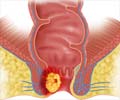Savitha was born a boy but became a girl at the age of 16. Nine years on, she sells cheap sex to lorry drivers at a dusty truck stop outside the southern Indian city of Bangalore.
As one of the hijra community - the cross-dressers, pre- and post-operative transsexuals known here as eunuchs - she is used to the prejudice and discrimination that comes with being bottom of India's rigid social ladder.But she and others like her who sell their bodies, sometimes for less than the cost of a packet of cigarettes, are helping India's fight against HIV-AIDS.
Whatever the price offered and however insistent the client, no condom means no sex.
"If the trucker doesn't want to use a condom and they insist, we won't do it," she told AFP, adjusting her salmon pink sari. "Even if we lose a client we will still have our health."
Twenty minutes' drive away, up the main highway from Bangalore to Pune in the west, Radhamma, another male-to-female transsexual who paid for Savitha's illegal sex change, has a similar rule.
"We won't do anything without a condom," said the 38-year-old. "If a driver or any person comes and wants sex without a condom we will slap him and send him out."
Savitha lives with three other hijra in a corrugated-roofed "hamam" or bathhouse up a rutted track at Madanayakana Halli off the main highway, where the air is a heady mix of stale sweat, urine, engine oil and cigarette smoke.
Radhamma heads a six-strong hamam next to a petrol station at a busy junction on the main Bangalore to Pune highway at Nelamangala.
Both are desperate, uninviting places for sex.
Yet in the absence of formal sex education in schools and with discussion of sex still generally taboo, these are the places where India will win or lose the fight against HIV-AIDS.
The Indian government estimates that between two million and 3.1 million people are living with HIV-AIDS.
The spread of the illness has been in part due to unsafe sexual practices among India's 7.7 million truckers who contract the virus after sex with prostitutes, passing it on when they sleep with their unsuspecting wives back home or even co-drivers.
Savitha's hamam is a dimly-lit stone-floored shack where the only signs of life are earrings neatly arranged under a lorry's wing mirror that serves as a looking glass, discarded flip-flops and unwashed clothes piled on a bench.
On the peeling, pink wall is a dog-eared poster showing three smiling truck drivers. In Hindi, it tells them to take care of their bodies just as they do their vehicles.
The poster was produced by the Bhoruka Charitable Trust, a local organisation supported by the Gates Foundation that works a 10-kilometre (six-mile) stretch of the nearby highway, telling truckers about safe sex.
It is the model for about 15 projects that have been set up at hotspots on highways across India, where truckers look for sex, alcohol or both after a long day in a hot and grimy cab on polluted, potholed roads.
All the projects are monitored by the Transport Corporation of India Foundation (TCIF), the social arm of the country's leading road cargo business. India's National AIDS Control Organisation is soon to oversee all the schemes.
According to the TCIF, long-distance truckers are on average more than three times more likely to have HIV than the general population, rising to six for those who work the roads in southeast India.
"The project is very helpful in supplying condoms," said Savitha. "More drivers know about the risks of HIV and sexually-transmitted infections now, but many still have no idea about how to use condoms. We teach them."
The charity also stages discussion groups about safe sex in hauliers' offices, themed daily street plays in truck stops and installs vending machines selling condoms for just five rupees (10 cents) each.
HIV testing is available at its medical centre on the highway, while truckers can get check-ups, discounted prescriptions or counselling at the organisation's travelling ambulance.
The preventative drive has found favour among the close-knit community of macho truckers, who admit it is helping them be more aware of the consequences of risky behaviour.
"Those who are becoming drivers now at age 18 to 20, they're avoiding these things totally," said Darshan Singh, 40, who drives the 2,300 kilometres (1,430 miles) from the northern city of Chandigarh to Bangalore.
"People are becoming more health conscious because of AIDS. The people who are funding these programmes are doing a very good thing for the country. It's really benefiting the people here."
Excluded from society and persecuted, India's hijras often have little choice but to beg or sell sex for a living. Human Rights Watch recently alleged there was a policy of "social cleansing" against hijras in the Bangalore area.
But their work in promoting safe sex is at least one small positive in a desperately hard life, not just for society as a whole but for themselves, said Radhamma.
"HIV is a very deadly disease," she said. "If we were having unsafe sex then we will die. If we lose our health, we lose our livelihood."
Source-AFP
LIN











